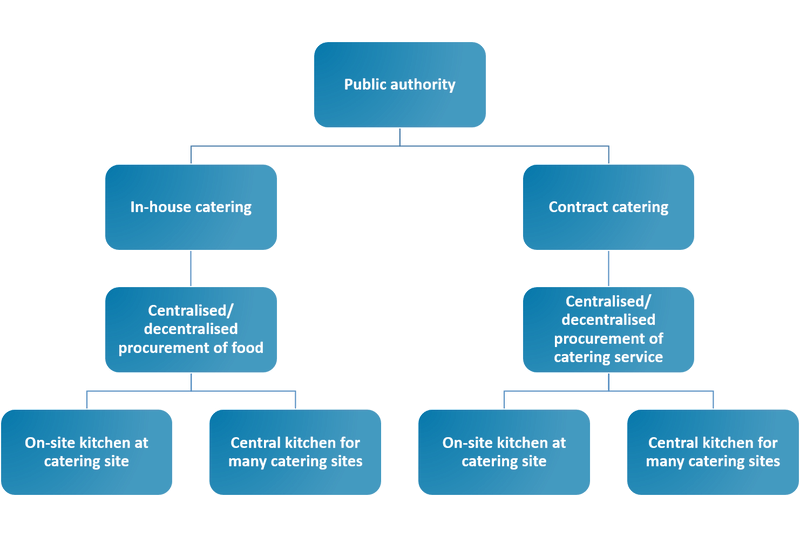Public meals are offered for a wide range of customers in the Baltic Sea Region (BSR), from kindergartens and schools, hospitals, elderly care, canteens in governmental and municipal offices, to armed forces and prisons.
Organisational models of public catering
Public authorities can play the role of both procurer and caterer (in-house catering) or outsource the catering service to external contractors (contract catering). The external contractor can be either a publicly or privately owned company providing catering services.
In the last half-century, there has been a general shift away from in-house catering towards contracting private catering services in the BSR, especially to provide meals in schools, hospitals, and nursing homes.
Procurement models
Public authorities (e.g. institutes at the state, regional or local governance level) either procure and cater the food themselves, or procure the catering service for public meals. The procurement in both cases can be centralised or decentralised. This means that the public authority can conduct procurement for all (or a group of) catering sites under its governance (centralised procurement). In the case of decentralised procurement, each institutional catering site either procures and caters food or procures catering services for itself.
Public procurement procedures include several steps: to write and publish a call for tender, assess the tenders from the bidders (suppliers), select one or several suppliers, draw up a contract with the supplier(s), and monitor compliance with the contract. The tendering authority (procurer) and its procurement officers are responsible for the call for tender.
In both procurement models (centralised/decentralised), the procurer must have in-depth knowledge of the catering and menu planning requirements. However, human resources can often be used more efficiently when procurement is organised centrally. Central procurement of larger volumes of food can also often secure advantageous wholesale prices and delivery conditions, as well as a wider choice of raw materials. On the other hand, decentralised procurement enables better engagement of smaller food suppliers and more diverse offerings, reconnecting the customers to local producers and reducing food miles.
Modes of meal preparation
Traditionally, public educational, health and welfare institutions in the BSR have on-site kitchens in their buildings, allowing meals to be prepared on the spot and delivered ready to eat. Systems where food is prepared either partially or fully in a central kitchen, and then transported to other foodservice locations represent an emerging trend. Central kitchens may provide hot meals (cook and serve), chilled pre-cooked meals to be heated up for serving (cook and chill), or compose meals from pre-processed cold components to be cooked at the site (cook cold).
On-site cooking can often allow for more flexibility in menu development and quicker response to changing demand, resulting in less food waste. While centralised kitchens can save on labour costs by enabling the caterer to employ fewer kitchen professionals, there are generally additional transportation costs. Food manufacturing on a larger scale may also require the purchase of more specialised kitchen equipment to enable the production of specific menu items.
Financing schemes of public meals
In the BSR countries, the practice of financing public meals provision ranges from zero to full subsidisation, with diverse specific arrangements. In the case of partial subsidies, the state and/or local government may cover some of the meal provision costs or, for example, offer kitchen premises, equipment, and dining areas for free to the catering service provider. A full subsidy by state and/or local government covers all costs for food, materials, energy, kitchen premises, dining areas and personnel needed for the meal provision.
Additionally, in the educational sector of the EU countries, the distribution of fruits, vegetables, and milk to pupils receives funding from the EU budget. For example, the combination of national school lunch allowance, local government, and EU support makes it possible to offer free-of-charge hot meals to all pupils every day in Estonia, Finland, and Sweden.
For more information about public procurement and catering services in the BSR countries read this StratKIT report: Joint Baltic Sea Region Report on public procurement and catering services.
